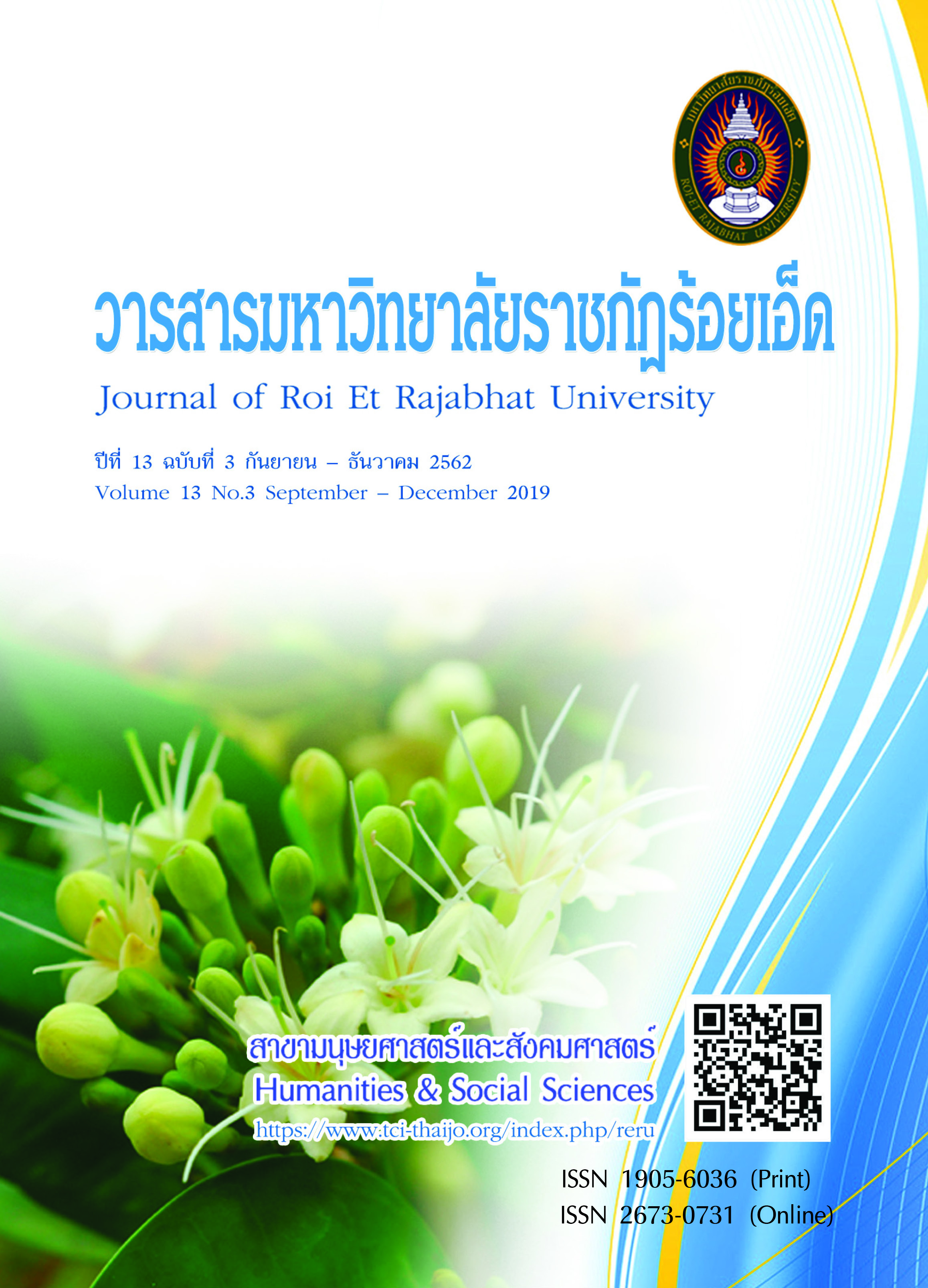The Development of Mathematics Learning Management Model for Sixth Grade Students in Schools under Sakon Nakhon Primary Educational Service Area Office 1
Keywords:
Model development, Learning management, Mathematics learning management modelAbstract
This study aimed to develop and assess the effectiveness of mathematics learning management model for 6th grade students. There were 2 phases in this study. The first phase was the development of mathematics learning management model while the second phase was effectiveness assessment of the mathematics learning management model. The sample group consisted of 30 sixth grade students in the academic year 2017, selected through purposive sampling. The research tools employed in this study were 1) mathematics achievement test; 2) a test on mathematical process skills in problem solving; and 3) a satisfaction questionnaire of mathematics learning, which was 5-level rating scale. Statistics used for data analysis consisted of percentage, mean, standard deviation and t-test for dependent samples. The findings are as follows. 1) The developed mathematics learning management model was effective at a high level. The model comprises 2 components, which were 1.1) the process; consisted of contents and procedure used in learning management, and 1.2) outcomes; this consisted of knowledge and understanding of students in mathematics learning. Students gain mathematical process skills and students are satisfied with mathematics learning. 2) The efficiency assessment of the developed mathematics learning management model, it was found that 2.1) mathematical knowledge and understanding of students after implementation of the model was higher than before the implementation at a statistical significance at .05 level; 2.2) the study of mathematical process skills, it was found that the mathematical process skills of students was at a high level, and 2.3) students’ satisfaction toward mathematics learning management through the implementation of developed model, it was found that students’ satisfaction was at a high level.
References
แบบร่วมมือกันเรียนรู้แบบ STAD เรื่องการบวก ลบ คูณ หารระคน ชั้นประถมศึกษาปีที่ 4. วิทยานิพนธ์
ศึกษาศาสตรมหาบัณฑิต สาขาวิชาหลักสูตรและการสอน. ขอนแก่น: มหาวิทยาลัยขอนแก่น.
จันทร์ฉาย ทองงาม. (2551). การพัฒนาทักษะการแก้โจทย์ปัญหาคณิตศาสตร์ โดยใช้กระบวนการแก้ปัญหาของโพลยา สำหรับนักเรียนชั้นต้นปีที่ 1. สืบค้นเมื่อ 12 กันยายน 2561, จาก https://www.vijai.org/Webboard/question.
asp?QID=87
ธิดารัตน์ พลหนองคูณ. (2556). การพัฒนากิจกรรมการเรียนการสอนคณิตศาสตร์ตามแนวทฤษฎีคอนสตรัคติวิสต์
โดยใช้การเรียนรู้แบบร่วมมือรูปแบบ STAD เรื่องพื้นที่ผิวและปริมาตร ชั้นมัธยมศึกษาปีที่ 3. วิทยานิพนธ์
ครุศาสตรมหาบัณฑิต สาขาวิชาการบริหารและพัฒนาการศึกษา. สกลนคร: มหาวิทยาลัยราชภัฏสกลนคร.
ปรียาภรณ์ เกลาเกลี้ยง. (2556). การศึกษาผลสัมฤทธิ์ทางการเรียนวิชาคณิตศาสตร์ของนักเรียนชั้นมัธยมศึกษาปีที่ 3
ที่เรียนด้วยชุดการสอน เรื่องความน่าจะเป็น ที่เน้นยุทธวิธีการแก้ปัญหาตามรูปแบบการแก้โจทย์ปัญหาของโพลยา.
วิทยานิพนธ์ การศึกษามหาบัณฑิต สาขาวิชาการบริหารการศึกษา. ชลบุรี: มหาวิทยาลัยบูรพา.
อารีรัตน์ โพธิ์คำ. (2551). การพัฒนาชุดการสอนแบบศูนย์การเรียนวิชาคณิตศาสตร์ เรื่องพื้นที่ผิวและปริมาตร สำหรับนักเรียน
ชั้นมัธยมศึกษาปีที่ 3 โรงเรียนบางลายพิทยาคม. วิทยานิพนธ์ ครุศาสตรมหาบัณฑิต สาขาวิชาหลักสูตรและการสอน.
นครสวรรค์: มหาวิทยาลัยราชภัฏนครสวรรค์.
Published
How to Cite
Issue
Section
License
บทความที่ได้รับการตีพิมพ์เป็นลิขสิทธิ์ของวารสารมหาวิทยาลัยราชภัฎร้อยเอ็ด
ข้อความที่ปรากฏในบทความแต่ละเรื่องในวารสารวิชาการเล่มนี้เป็นความคิดเห็นส่วนตัวของผู้เขียนแต่ละท่านไม่เกี่ยวข้องกับมหาวิทยาลัยราชภัฎร้อยเอ็ด และคณาจารย์ท่านอื่นๆในมหาวิทยาลัยฯ แต่อย่างใด ความรับผิดชอบองค์ประกอบทั้งหมดของบทความแต่ละเรื่องเป็นของผู้เขียนแต่ละท่าน หากมีความผิดพลาดใดๆ ผู้เขียนแต่ละท่านจะรับผิดชอบบทความของตนเองแต่ผู้เดียว





